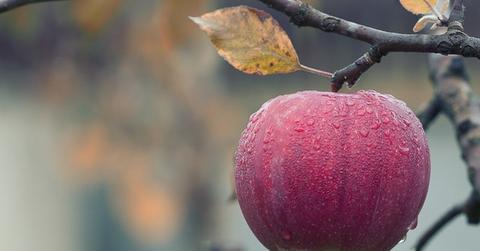New Study Suggests Organic Farming Can Cut Greenhouse Gas Emissions
Land management is a way to significantly reduce greenhouse gas emissions, and farmers are on the front lines of stewardship.
Updated May 20 2019, 1:01 p.m. ET
People who eat organic know that vegetables and fruits from the farmer's market are often fresher, tastier, and more compelling than the conventional grown items found in grocery stores. But does eating organic actually have any benefit for the planet? One study is saying absolutely.
Published in the journal Natural Communications, the study found that conventional farming could be converted to organic without losing crop yield or requiring more land, and it would have an overall beneficial effect on greenhouse gas emissions. The Guardian reports that the study recommended increasing a vegetarian diet in combination with organic food production would work for most regions, and suggested ways of cutting food waste while fixing nitrogen to the soil without the use of chemical fertilizers.
A concern around organic farming has been that it requires more land to produce just as much food as conventional growing, which could lead to deforestation and other land use shifts that would increase greenhouse gas emissions. But, according to the model in this study, that sort of expansion wouldn't be as necessary as people think.
In general, organic farmers manage the land very differently than conventional farmers. Instead of chemical fertilizers and frequent tilling, soil is kept rich through the use of manure, planting cover crops, and having less homogeneity in produce. Trees are grown near organic cropland more frequently, and the land gets mulched regularly, keeping it rich and healthy.
While much attention is given to divesting from fossil fuels in the fight against climate change, scientists are urging legislators to pay more attention to smaller issues like land management, which also have a huge impact on the planet. This study is good news for people pushing for more research on the subject and change in agricultural practices. But some are hesitant to fully get behind the findings.
One professor of sustainable agriculture at Leeds University, Les Firbank, told The Guardian that the study is promising, but simplistic in comparison to the very complicated reality of farming systems across the world.
“One of the question marks about organic farming is that it can’t feed the world. [This paper] concludes organic farming does require more land than conventional methods, but if we manage the demand for food by reducing waste and reducing the amount of crops grown as animal feed, organic farming can feed the world," he said. “[These] models can only be viewed as a guide: there are many assumptions that may not turn out to be true and all these scenario exercises are restricted by limited knowledge [and] are fairly simplistic compared to real life, but realistic enough to help formulate policy. The core message is valuable and timely: we need to seriously consider how we manage the global demand for food.”
Meanwhile, you can always buy organic from local growers and support organic farming in your area, until the rest of the world catches up.
